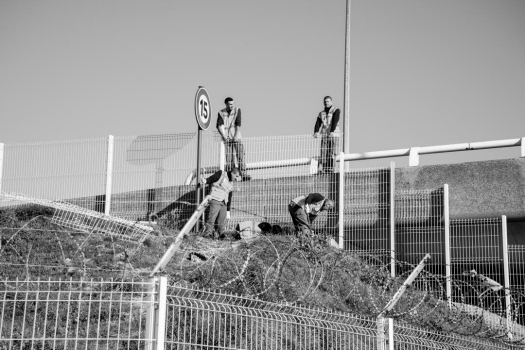Campus News
Events explore traumatic journeys migrants endure on the way to the border
The series of UC Santa Cruz events on human migration continues Friday and Saturday, May 6–7 with “Rethinking Migration,” the first in the Andrew W. Mellon Foundation Sawyer Seminar on non-citizenship and part of the Chicano Latino Research Center’s Borders and Belonging series.



The series of UC Santa Cruz events on human migration continues Friday and Saturday, May 6–7 with “Rethinking Migration,” the first in the Andrew W. Mellon Foundation Sawyer Seminar on non-citizenship and part of the Chicano Latino Research Center’s Borders and Belonging series.
The conference begins at 8:30 a.m. both days at the Merrill Cultural Center and will feature visiting scholars and UCSC professors in the humanities and social sciences who will focus on issues surrounding migration. The sessions are free and open to the public.
Kicking off the Borders and Belonging series April 29 was a screening of María en Tierra De Nadie (Maria in Nobody’s Land), the award-winning documentary chronicling migrants crossing central America. The event also honored the 15th anniversary of the Department of Latin American and Latino studies.
More than 500 students, alumni, staff, faculty, and community members packed the Rio Theatre in Santa Cruz for the film that documents the harrowing journey migrants make before they even get to the U.S.-Mexico border. A Q&A with filmmaker Marcela Zamora followed.
“It was a powerful experience watching it together,” said Pat Zavella, professor and LALS department chair.
“It is a hard movie to watch,” said Chicano Latino Research Center director Catherine Ramírez, “but it tells a story that must be shared.”
Zamora, along with her partner and journalist Óscar Martínez, spent months accompanying migrants to learn about the problems they encounter.
“Women arrive to America raped, traumatized, and destroyed,” Zamora said. “There isn’t a process to tell their story.”
The film includes an interview in a brothel with a woman who was tricked into taking a job as a waitress but then forced to pay her way a prostitute. In another scene, Zamora meets another woman who was sold by her own uncle as payment for his freedom after the pair was kidnapped by a local gang. Zamora includes another story of a woman who loses a foot after being pushed off a train by a drunk.
“Documentary is a tool to illuminate those dark corners in order to make people uncomfortable,” Zamora said.
The conversation continued the next day with Martínez, author of The Beast: Riding the Rails and Dodging Narcos on the Migrant Trail (2013) based on Zamora and his experiences.
“A lot of people arrive here with a lot of damage,” Martínez emphasized, adding that many migrants do not share their stories so they are not reported by mainstream media.
“Journalism puts a light on dark corners of our society.” said Martínez.
“These people are your gardeners, cooks, and neighbors, and you don’t know them,” said undergraduate and first-generation student Adriana Garcia (College Eight, ’17, Latin American and Latino studies and politics).
“We owe a lot of respect to them. Their knowledge is just as important if not more,” she said.